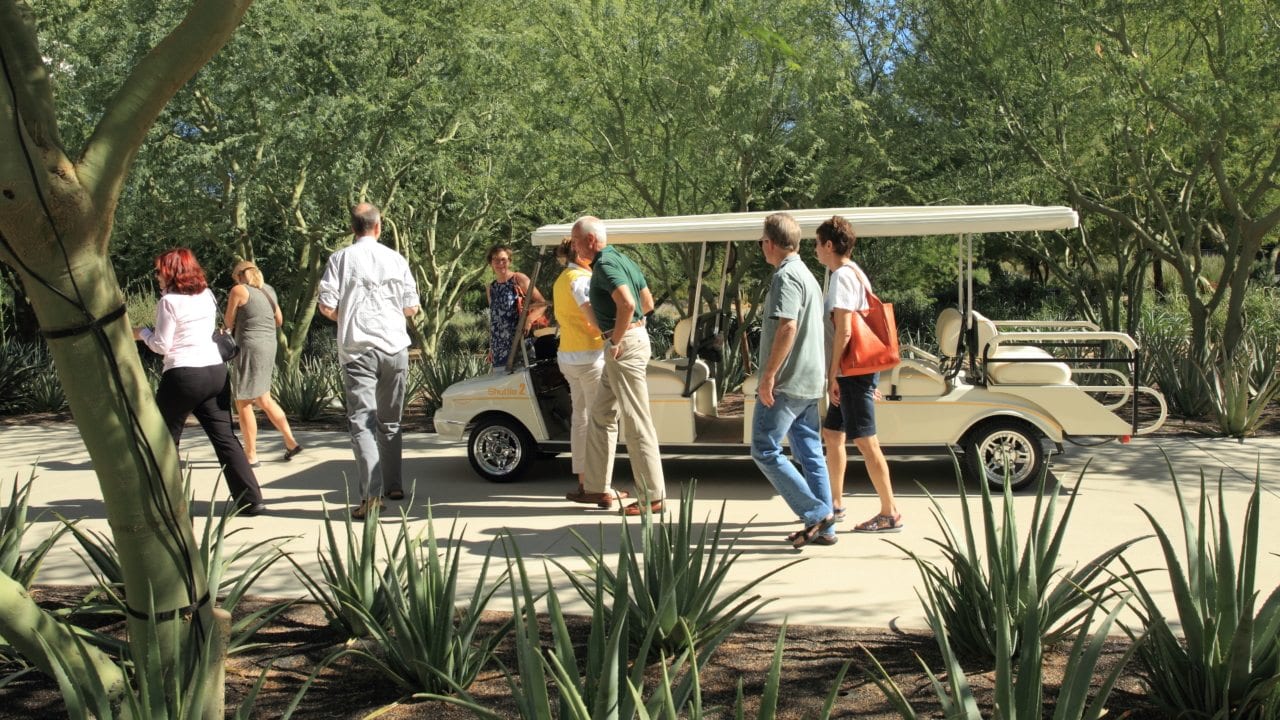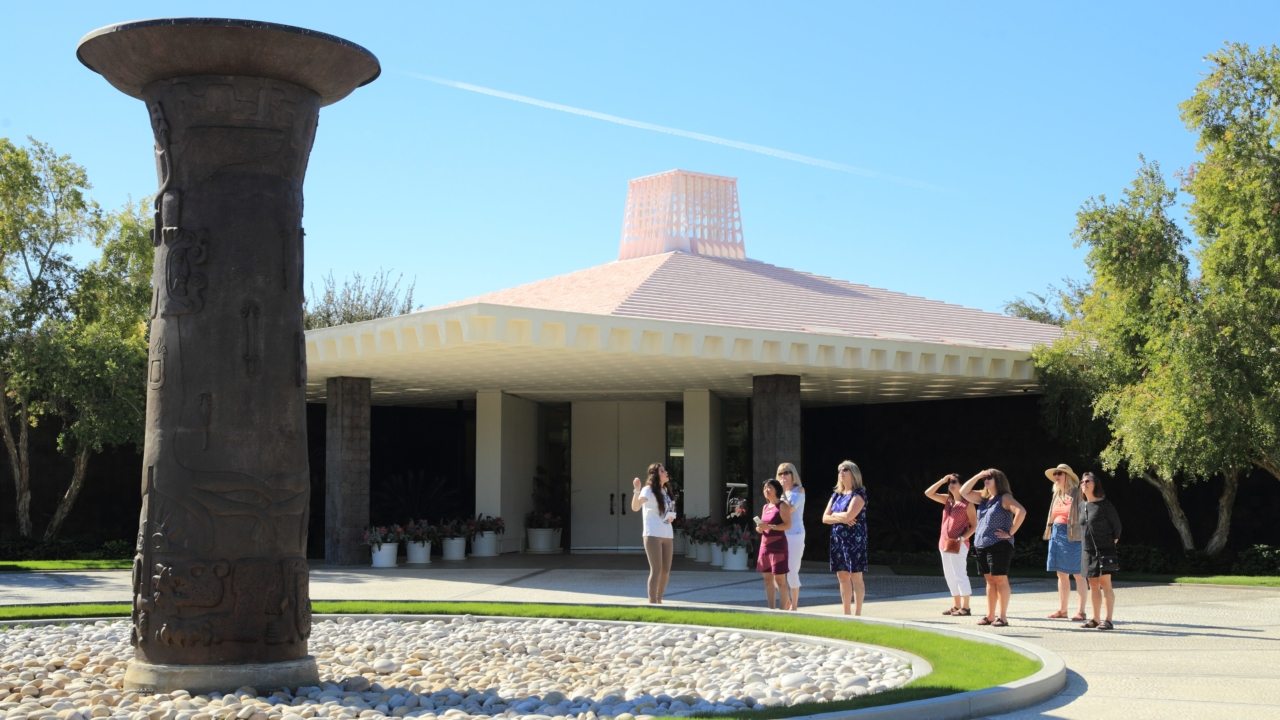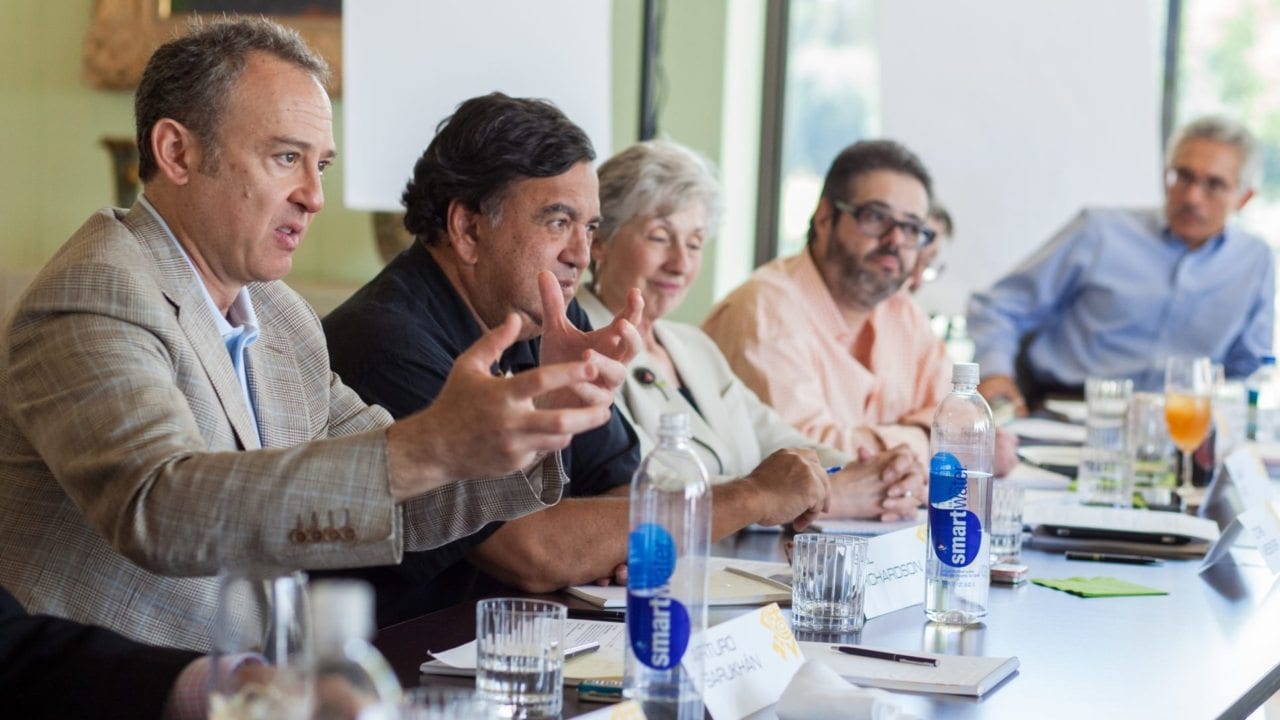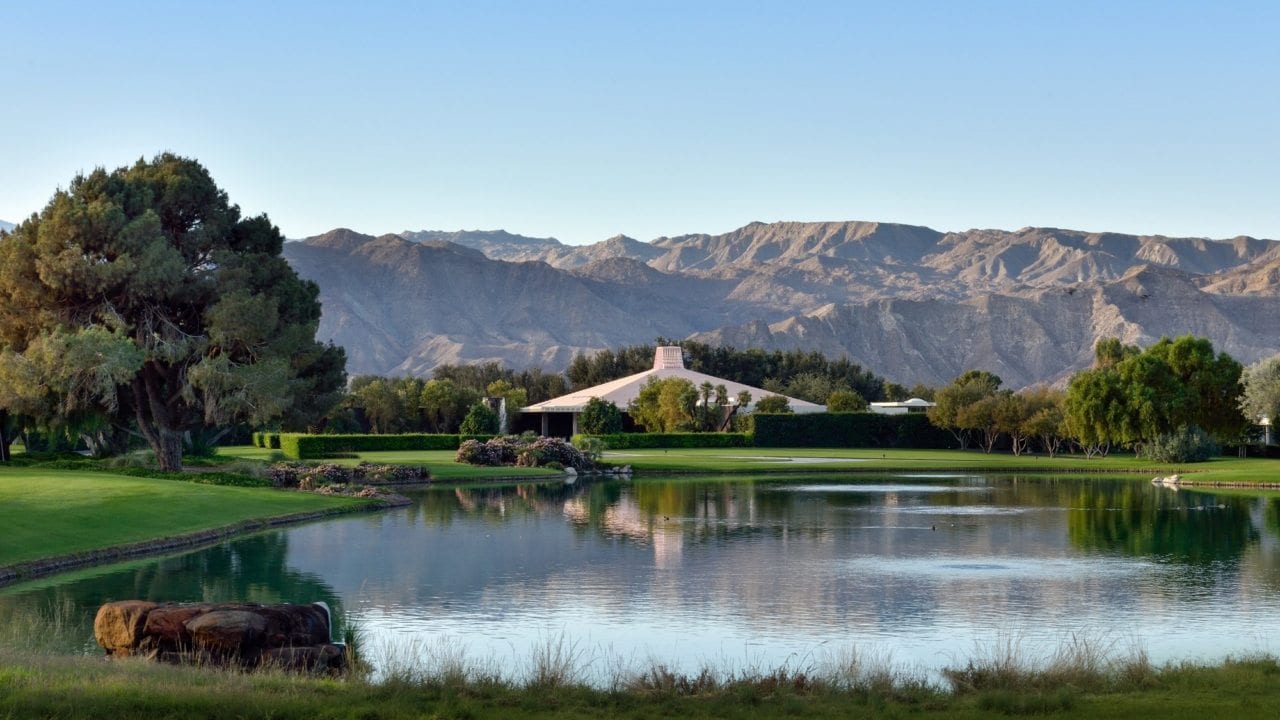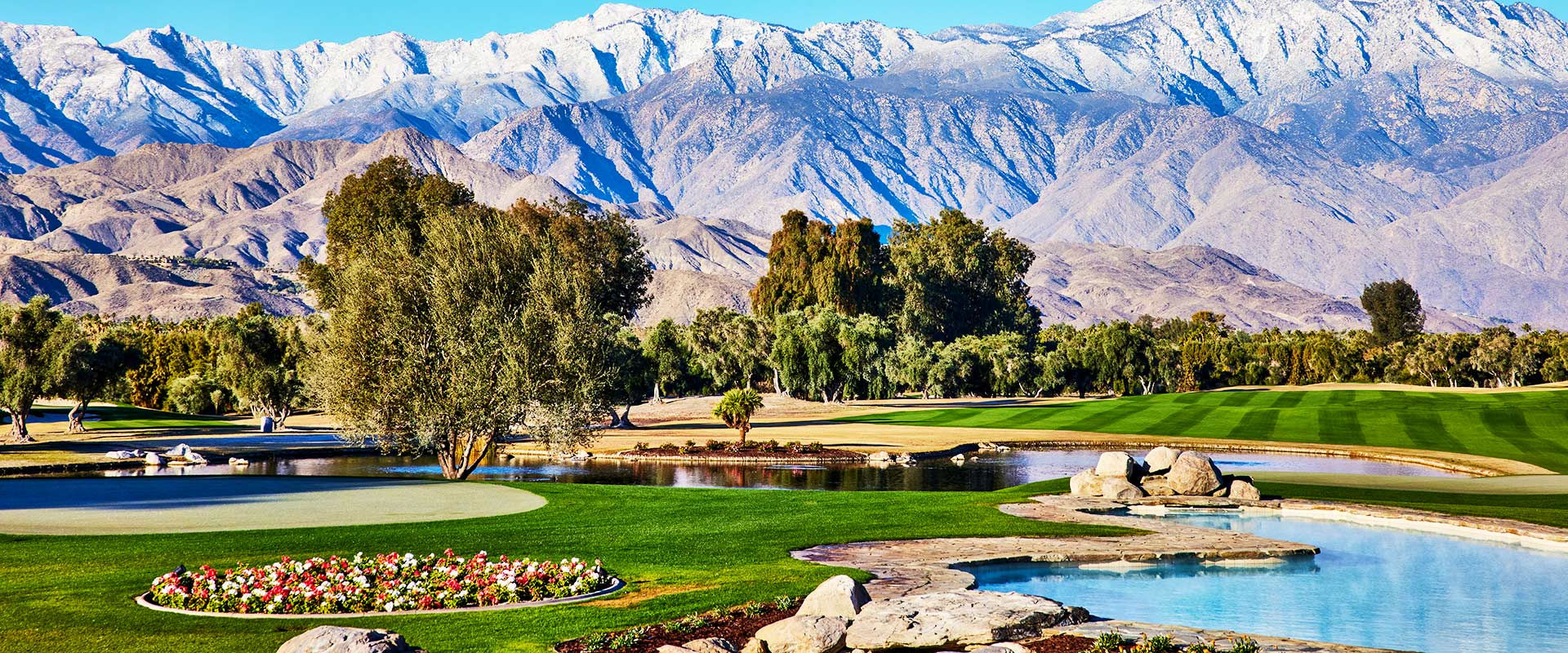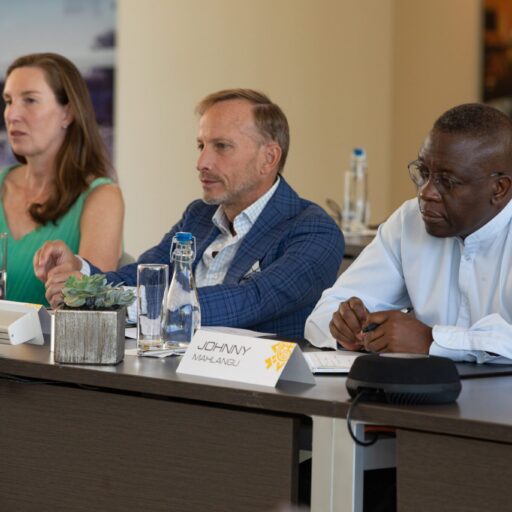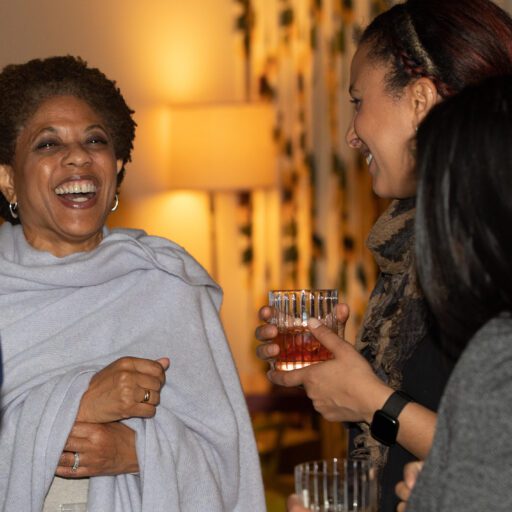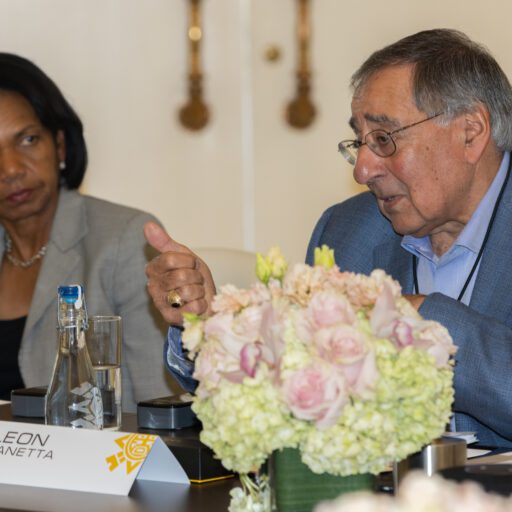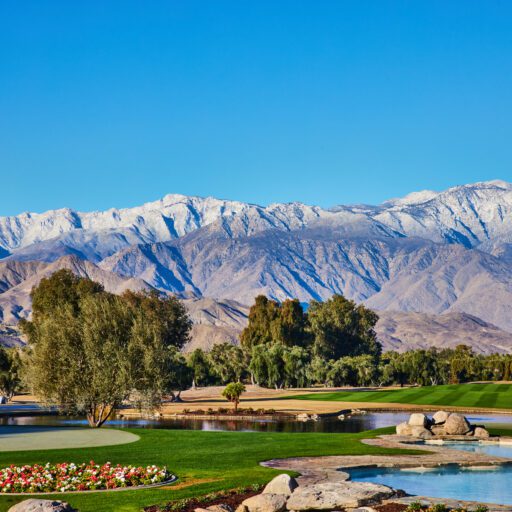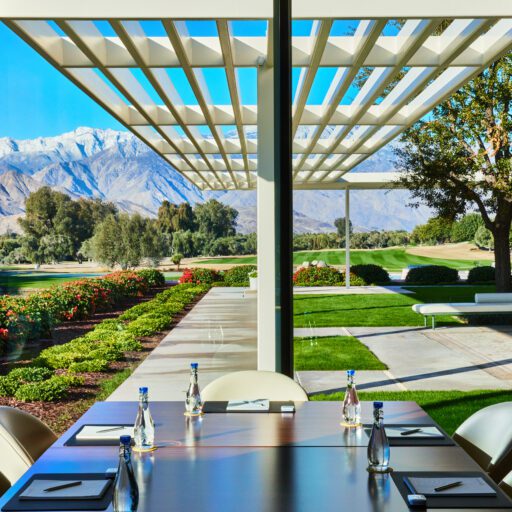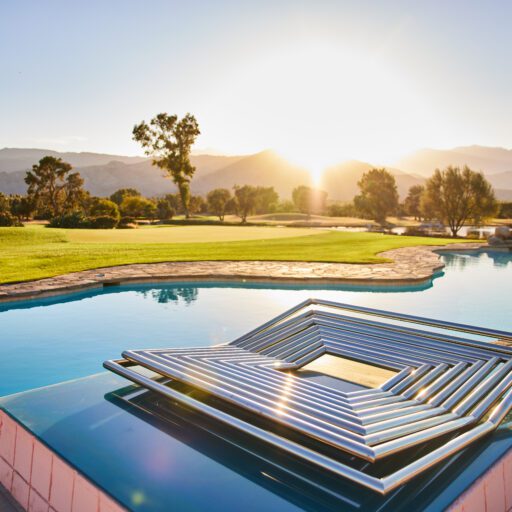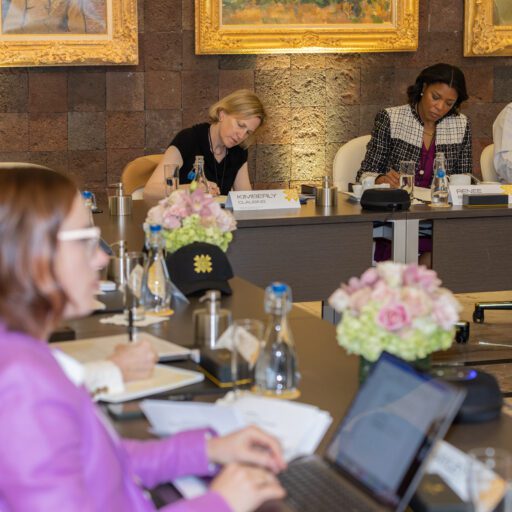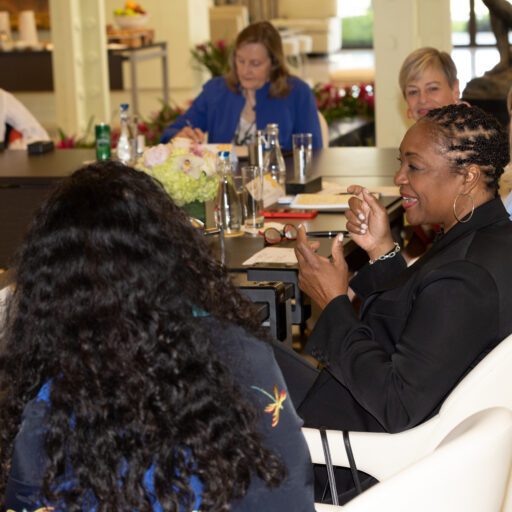A Message from President David J. Lane
SUNNYLANDS:
A SANCTUARY FOR SOLUTIONS IN A DIVIDED WORLD
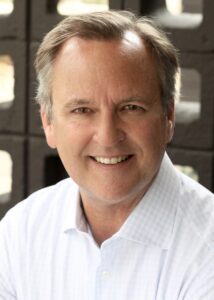
In this letter, which we intend to be an annual communication with our partners and friends, I hope to bring you inside the retreat program of The Annenberg Foundation Trust at Sunnylands. To many, this program may seem mysterious, or even invisible. I would like to pull back the curtain and share a bit about what we do.
Since 2012, when the Annenberg family opened their iconic Rancho Mirage, California home to the public, Sunnylands has been known to two groups: the tens of thousands of tourists who visit this historic midcentury modern house in the desert each year, and the far smaller number of leaders who participate in the carefully curated public policy retreats we host here.
We are exceedingly proud of the role we play in the Coachella Valley community. In the public season that started in September 2022 and concluded in June 2023, Sunnylands hosted just over 112,000 visitors for tours of the historic house and public events, a success our patrons Walter and Leonore Annenberg could only have dreamed about.
Over that same period, we also hosted 10 retreats that were attended by leaders from the United States and around the world, and which generated outcomes on issues ranging from global hunger to democratic expression, to peace and security.
Historically, Sunnylands has preferred to operate this convenings program discreetly. We will continue to value this discretion as a central element of our success. However, we have decided that our mission will be better served if we share with our stakeholders selected aspects of our work, outcomes, and lessons learned.
Our politics and problem-solving today are marred by increased polarization and dysfunction, which argues for a renewed commitment to collaboration and discourse. At this precarious time in our civic life, we want to share what we have learned in the hope that it might help others. To be clear, my Sunnylands colleagues and I haven’t figured it all out. But we have learned a lot about helping to catalyze collaboration in a divided world and, we believe, achieved noteworthy successes along the way.
CATALYZING COLLABORATION
Completed in 1966, Sunnylands has a storied history. Over 40 years, Walter and Leonore Annenberg welcomed seven American presidents, heads of state, business leaders, leading cultural figures, and many others to the estate for civil discussions where they could build new relationships, explore new ideas, and find solutions to pressing challenges. In 2001, the Annenbergs elected to continue this legacy by preserving the estate as a venue where future generations of leaders could meet with their counterparts. This mission guides us today.
Our work is simple and bold: to convene summits and retreats where leaders, thinkers, and doers from around the world can creatively and confidentially discuss solutions to our greatest global challenges.
Given such a large canvas of potential issues for discussion, we decided to focus our efforts in three areas that challenge today’s policymakers: global cooperation in the Indo-Pacific region and Western Hemisphere; civic and democratic engagement in the United States; and global health and food security.
In the past eight months alone, our retreats in these areas were attended by global leaders that included a state governor, special envoys of the United Nations, senior U.S. military and diplomatic officials, former U.S. Secretaries of Defense and State, CEOs and presidents of private industry and foundations, and civic and media leaders.
The retreat topics and outcomes varied, but all were held in service of a simple, vital mission: to use honest, face-to-face discussions to unearth and implement solutions to our planet’s most pressing problems.
One of the most frequent adjectives participants use to describe Sunnylands retreats is “transformative.” In the words of one recent participant, “At Sunnylands, participants often come in as strangers and ideological foes. They leave as collaborators and friends.”
“Dark days call for humanity. Sunnylands represents that.”
Sunnylands retreat attendee
When we put all the pieces together, we like to think our convenings are not just unique, but uniquely necessary. An example comes from 2019 when we were honored to reunite surviving members of Dr. Martin Luther King Jr.’s inner circle and friends—including Dr. Clarence Jones, Andrew Young, and Joan Baez—alongside younger civil rights activists to share their memories of the civil rights leader and build on his historic legacy in our modern era.
So, what have been the elements of success and what can they teach those of us who are called to create positive change in the world? My colleagues and I believe that we have developed an approach that can yield successful change across barriers, which I would group into three buckets:
- Driving for solutions, not just good dialogue
- Summoning our participants’ better angels
- Nurturing our network to extend our knowledge and reach.
I hope you might find our observations valuable in the settings in which you operate.
DRIVING FOR SOLUTIONS
I believe, and experience bears out, that policymakers and leaders are hungry to partner with people and organizations like Sunnylands that prize solutions over parochial concerns. Our challenge is that there is more demand than we can accommodate.
Every year, national and global leaders approach us with dozens of ideas for convenings, which we then must winnow down to 10 or so. Our chief criterion for doing so is our “Solutions Test”: Does this convening have a high likelihood of producing tangible outcomes rather than just memorable discussions?
After we select our retreats, our experienced retreats team, led by accomplished diplomat and former U.S. ambassador Kathleen Doherty, remains closely involved in the six-month design process, working with partners and key participants to ensure that every aspect, from agenda to attendees, would drive toward meaningful solutions.
The result of this unwavering focus on solutions is that, by the time of their retreat, attendees are confident that outcomes can be achieved. And not only that, our focus on outcomes—and the shared confidence it inspires in attendees—creates flexibility, trust, and give-and-take between participants that can lead to fortuitous breakthroughs.
At a 2020 retreat focused on transforming global food systems in partnership with the UN Special Envoy for the 2021 Food Systems Summit, we broke a key impasse by creating working groups and tasking them to create “action tracks” for discussion. These tracks formed the substantive backbone of the historic September 2021 UN Food Systems Summit that today guides the global agenda on food systems transformation.
I will offer a few more recent illustrations of how concrete outcomes can bridge boundaries and create consensus on tough issues.
In May 2022, Sunnylands partnered with the American Academy of Arts & Sciences to host Strengthening American Democracy Through Civic Investment, which explored how to develop effective actions to reknit America’s social fabric. This retreat convened top leaders from across the political spectrum who shared a deep concern about the fragility of our democracy, ranging from the CEO of a foundation run by a conservative industrialist to the head of a largely progressive Northern California community advocacy organization. Despite substantial differences between participants’ perspectives and politics—actually, because of them—the retreat was a nonpartisan success.
Based directly on the group dynamics at Sunnylands, three national foundations have since formally joined together to launch a new Trust for Civic Infrastructure that will support communities working to build the local institutions necessary for a resilient and robust democracy. This new trust has already attracted an initial $13 million in philanthropic commitments toward its goal of improving the civic infrastructure of our country, starting with rural regions and technology.
Five months later, Sunnylands partnered with More Perfect to host a retreat entitled Democracy Goals: Launching a Roadmap for Impact by 2026. Retreat participants worked together to refine a set of five Democracy Goals modeled on the UN’s Sustainable Development Goals. Thanks to the momentum from the retreat, 14 Presidential Centers are now joining forces to advance the five goals—the first time in history that they will collaborate on such an initiative.
Whereas both retreats addressed multiple topics within broad, high-level initiatives, over the last year we also had the opportunity to go deeper on certain issues that were raised in those discussions—namely, adult low literacy and the decline of local news in the U.S. and its impact on communities. In November 2022 and January 2023, respectively, we partnered with The Barbara Bush Foundation for Family Literacy, The John D. and Catherine T. MacArthur Foundation, and Civic News Company (publisher of Chalkbeat) to host summits on both topics where practitioners, experts, and philanthropists meticulously discussed promising solutions to these specific crises threatening American democracy.
Lastly, we continued our longstanding and productive partnership with the Annenberg Public Policy Center at The University of Pennsylvania and the National Academy of Sciences to host retreats that identify actions to protect the integrity of science and ways the scientific community can respond to societal needs.
SUMMONING OUR BETTER ANGELS
Our experience is that most leaders are sincere in their desire to achieve positive change. Yet, the tyranny of the “real world”—our responsibilities and schedules; turf fights and budget battles; and the myriad of other day-to-day concerns—can waylay even the most well-meaning of us. Our approach seeks to remove participants from these pressures, allowing them to let down their masks and reconnect with what Abraham Lincoln would call the “better angels of their nature.”
When we invite participants to Sunnylands, we make clear that we are seeking their full and authentic engagement—without staff, substitutes, or modern distractions. To further encourage them to bring the highest levels of candor and individual (not institutional) thinking, Sunnylands enforces a rule whereby all discussions are off-the-record, and that individuals’ names or organizational affiliations are never shared without permission.
When onsite, we foster high-trust, low-ego dynamics by keeping numbers small and choreographing meeting mechanics to break down walls. To create a conversation, rather than a series of presentations, we limit our retreats to a maximum of 22 attendees, and we carefully curate seating arrangements and avoid using titles to dispense with pomp and circumstance.
Let me provide an example.
In May of this year, we partnered with the Hoover Institution at Stanford University to hold our second Indo-Pacific Security Dialogue at Sunnylands. Co-hosted with former Secretary of State Condoleezza Rice, former Defense Secretary General Jim Mattis, and former Defense Secretary Leon Panetta, we convened senior defense and diplomatic officials from Australia, India, Japan, the United Kingdom, and the United States. All participants were referred to on a first-name basis.
While there are opportunities for these leaders to meet face-to-face throughout the year, these typically happen at highly scripted security conferences attended by hundreds of people. The Sunnylands Dialogue was a rare setting where high-ranking leaders could not only discuss pressing regional security issues but also connect at a deep level and forge personal relationships that will help resolve future crises.
We also augment our left-brain discussions, like those noted above, with right-brain modalities that bring harmony and creativity to the equation. Sometimes this provides levity and joy to the proceedings, such as in May 2022 when Dr. Francis Collins, the former head of the National Institutes of Health, grabbed his guitar and jammed with Ugandan musician and HIV advocate Moses “Supercharger” Nsubuga.
Even our surrounding geography can play a transformative role.
Our setting at the base of the Santa Rosa and San Jacinto Mountains creates an intimate, yet expansive, environment where problems seem small—the opposite of the mahogany rooms and conference halls that often reinforce hierarchies. Indeed, past attendees often recount how an impromptu walk at dawn, a game of golf, or a quiet drink with a fellow participant in this setting provided a relaxed space where breakthroughs were possible.
In the end, it is this mélange of setting, poignancy, preparation, and, most importantly, of people that creates the context for participants to follow the urgings of their better angels during our discussions.
NURTURING OUR GLOBAL NETWORK
Continually expanding our network of supporters and advisors makes the other two key elements of the Sunnylands approach possible.
Our team spends as much as half its time building and managing relationships with experts in our three priority areas and engaging our growing alumni network. In the process, we venture beyond every line of division—that is, across the aisle, sector, discipline, ethnicity, race, geographic boundary, and every other identity.
This network is how we source and sustain our workflow, maintain credibility, and keep our finger on the pulse of global conversations in our areas of focus. In short, it is instrumental to our success.
In addition, we also rely on the insight of stellar advisory boards we have constructed for each of our three priority issues—a handful of outside leaders who help guide our work in their respective fields. For example, our global health retreats benefit from the networks and insights of Ambassador Mark Dybul, MD, a physician-scientist-executive who helped build the President’s Emergency Plan for AIDS Relief (PEPFAR) into the world’s “most successful global health program.”
At a May 2022 summit focused on ensuring equitable access to gene therapy for HIV and sickle cell disease patients, Ambassador Dybul joined us in bringing together scientists and leaders who offered different pieces of the overall puzzle. Critically, Sunnylands positioned African leaders—rather than funders or governments in the global North—to lead the discussions.
An attendee at this summit later contacted Sunnylands to organize a retreat on how California could continue to build up its public health systems during the evolving COVID-19 pandemic. After several months of intensive preparations, we hosted this retreat in October 2022 for two dozen senior California and national health officials, joined by the Governor and the First Partner, as well as leaders in academia, communications, and philanthropy.
Our network and those of our advisors have also allowed us to play a key role in building democracy and security partnerships in the Indo-Pacific region. China’s increasingly aggressive foreign policy has put unprecedented strain on its democratic neighbors and highlighted a need for a regional platform for democracy support.
That platform has now emerged, thanks in great measure to a series of interrelated retreats we co-hosted in recent years.
The first of those retreats, held in partnership with the National Endowment for Democracy, brought together influential leaders from the United States, Japan, India, Australia, South Korea, Indonesia, and the Philippines. The retreat led directly to the launch of the Sunnylands Principles on Enhancing Democratic Partnership in the Indo-Pacific Region, which, in turn, has sparked significant action and investment, including follow-on meetings of the “Sunnylands Initiative” in Japan in 2022, and a few months ago, in Australia. For example, Japanese civil society organizations are now engaging government and NGO partners across the region in new levels of democratic partnership.
BEING PART OF THE SOLUTION
I am eager to share what we have learned about bridge-building for a simple reason: America’s hyper-partisanship is frightening and dangerous.
Nothing in my prior life in and around government allowed me to foresee that partisan fear and anger would rise so high. The New York Times recently reported that 42 percent of both Republicans and Democrats view members of the opposing party as “evil.” Those are the kind of statistics my former diplomatic colleagues see in authoritarian countries or those on the verge of violent conflict. We never thought we would see them in 21st-century America.
One of the most frequent adjectives participants use to describe Sunnylands retreats is “transformative.”
Sunnylands retreat attendee
This is why we feel a tremendous responsibility to make Sunnylands a part of the solution. And this is why we take such pride when we are successful in tamping down fear and building up trust, when we bring unlikely allies together for the first time, when we spark collaboration that could not have happened elsewhere, and when Sunnylands convenings galvanize global action.
We could not do this without our partners—past, present, and future—and those of you who are the leaders, thinkers, and doers in your respective fields and who are working and striving, together, to make our world a bit better.
Warmly,


David J. Lane
President, The Annenberg Foundation Trust at Sunnylands
